Trump calls Springsteen a ‘dried out prune’ and labels ex-FBI chief James Comey a ‘dirty cop’
Donald Trump slammed Bruce Springsteen on social media calling him a ‘dried out prune of a rocker’, labelled ex-FBI chief James Comey ‘a dirty cop’ and claimed he is why Taylor Swift is MIA.
North America
Don't miss out on the headlines from North America. Followed categories will be added to My News.
US President Donald Trump has gone on a wild rant against Bruce Springsteen calling The Boss a “dried out prune of a rocker”. and labelled former FBI chief James Comey a “dirty cop” on social media.
Mr Trump, 78, took to his Truth Social to respond to Springsteen calling him “treasonous” and “unfit to lead” during his first concert kicking off his The Land of Hopes and Dreams tour in Manchester, England.
The 75-year-old rocker made several angry speeches on stage telling the Manchester crowd America’s 47th president was leading a “corrupt, incompetent and treasonous administration” adding Mr Trump was “an unfit president” heading up “a rogue government”.


The veteran rocker told fans that in the US, “the richest men are taking satisfaction in abandoning the world’s poorest children to sickness and death … they’re taking sadistic pleasure in the pain they inflict on loyal American workers … They are abandoning our great allies and siding with dictators against those struggling for their freedom.”
The singer’s outburst prompted Mr Trump to respond with a lengthy rant via the social media platform Truth Social.
Earlier Mr Trump posted that he was the reason Taylor Swift has dropped off the radar.
The music superstar has been bunkered down with boyfriend Travis Kelce and rarely seen in public since wrapping up her wildly successful Eras tour.
While conspiracy theories have abounded, Mr Trump says he knows the real reason for the singer’s disappearance.
“Has anyone noticed that, since I said “I HATE TAYLOR SWIFT,” she’s no longer “HOT?” Mr Trump mused on Truth Social on Friday.

Swift raised the ire of Mr Trump when endorsed his opponent Kamala Harris during the US election.
The hit maker encouraged her followers on Instagram to get out and vote, signing off the missive by calling herself a “Childless Cat Lady” – a reference to an infamous quote by Vice President JD Vance.
SECRET SERVICE PROBES EX FBI DIRECTOR
Donald Trump labelled former FBI director James Comey a “dirty cop” Friday (Saturday AEST) over a social media post that the US president deemed a veiled call for assassination and which prompted a Secret Service probe.
Mr Comey was interviewed by the Secret Service the same day over his now-deleted post on Instagram earlier this week that showed an image of “86 47” spelled out in sea shells.
The number “86” is commonly used as slang to mean getting rid of something or ejecting someone — especially in restaurant and bar settings when referring to menu items. Mr Trump is the 47th president of the US.
“Cool shell formation on my beach walk,” the FBI chief-turned-crime novelist captioned the post.
In an interview with Fox News Special Report host Bret Baier on Thursday (Friday AEST), Mr Trump said of Mr Comey’s actions: “He knew exactly what that meant. A child knows what that meant … That meant ‘assassination, and it says it loud and clear. Now, he wasn’t very competent, but he was competent enough to know what that meant.”
Mr Trump added: “He’s calling for the assassination of the president.”

Mr Trump fired the FBI director in his first administration and claims Mr Comey still has an axe to grind.
“Well, he apologised because he was hit — he’s a very bad guy,” Mr Trump said.
The president did not take a position on whether Mr Comey should be investigated, saying he would defer to Attorney-General Pam Bondi.
Trump administration officials and the president’s eldest son, Donald Trump Jr, immediately interpreted Mr Comey’s post as a death threat against the commander in chief.
Just James Comey causally calling for my dad to be murdered.
— Donald Trump Jr. (@DonaldJTrumpJr) May 15, 2025
This is who the Dem-Media worships. Demented!!!! pic.twitter.com/4LUK6crHAT
“While President Trump is currently on an international trip to the Middle East, the former FBI Director puts out what can clearly be interpreted as ‘a hit’ on the sitting President of the United States — a message etched in the sand,” White House deputy chief of staff Taylor Budowich wrote on X. “This is deeply concerning to all of us and is being taken seriously.”
“Just James Comey causally [sic] calling for my dad to be murdered,” Trump Jr. tweeted, sharing a screenshot of the former FBI director’s Instagram post. “This is who the Dem-Media worships. Demented!!!!”
Department of Homeland Security Secretary Kristi Noem indicated that the Secret Service is now involved in the matter.
“Disgraced former FBI Director James Comey just called for the assassination of @POTUS Trump,” she wrote on X. “DHS and Secret Service is investigating this threat and will respond appropriately.”
Mr Comey, who launched the investigation into allegations of collusion between Russia and Mr Trump’s 2016 presidential campaign — which rested on debunked intelligence from the infamous Steele dossier — claims he “didn’t realise” some would view the post as a call for violence.
FOLLOW UPDATES BELOW:
COUNTRIES WILL KNOW TARIFF FATE WITHIN WEEKS
President Trump said Friday that the White House will send out letters in the next few weeks informing countries around the world what their new tariff rates will be.
“We have, at the same time, 150 countries that want to make a deal, but you’re not able to see that many countries,” Mr Trump said while travelling in the UAE.
“So at a certain point, over the next two to three weeks, I think (Treasury Secretary) Scott (Bessent) and (Commerce Secretary) Howard (Lutnick) will be sending letters out, essentially telling people – we’ll be very fair – but we’ll be telling people what they’ll be paying to do business in the United States.”
TRUMP SIGNS LANDMARK AI DEAL WITH UAE
The United States has signed a deal with the United Arab Emirates (UAE) that puts the Gulf country on a path to becoming a rising power in artificial intelligence.
The announcement was made as US President Donald Trump attended the unveiling of a new AI campus with UAE President Sheik Mohamed bin Zayed al-Nahyan in Abu Dhabi on Thursday (local time).
The campus is part of a planned artificial intelligence project built by the Emirati AI company G42 in partnership with several US companies.
As part of the agreement, the AI campus will also be supplied with American-made AI chips, making it the largest such project outside the US.

The deal builds on an existing agreement between the countries — the US-UAE AI Acceleration Partnership — and aims to deepen both countries’ collaboration on artificial intelligence.
It comes after the US President received a rock star welcome to Abu Dhabi on Thursday (local time).
Mr Trump was clearly wowed by a group of women performing traditional “Al-Ayyala” hair flip dance as dozens of children greeted the American leader waving US and UEA flags in Abu Dhabi.
Mr Trump proclaimed: “I love it!” to reporters nearby as the over-the-top welcome was performed.

Earlier, President Trump received an eight-fighter jet escort as Air Force One arrived in Qatar for the second stop on his three-nation tour of the Middle East.
The show of respect appeared to one-up the emirate’s neighbouring frenemy Saudi Arabia, which provided a six-fighter jet escort earlier this week.

Journalists aboard Air Force One spotted four Qatari jets off the right side of the plane while White House press secretary Karoline Leavitt tweeted footage of four more to the left.
Mr Trump said Qatar Airways had placed a “record” order for 160 planes from Boeing worth more than US$200 billion (A$310bn) as he signed a raft of deals in Doha alongside Qatar’s emir.

“It’s over $200 billion but 160 in terms of the jets. That’s fantastic. So that’s a record,” Mr Trump said, adding: “It’s the largest order of jets in the history of Boeing. That’s pretty good.”
His comments followed a deal signing ceremony that included defence agreements including on defence co-operation and the purchase by Qatar of American MQ-9B drones, after about two hours of talks with Qatar’s Emir Sheikh Tamim bin Hamad Al-Thani.
His Qatar visit is the second destination of his Gulf tour, after a first stop in Riyadh, where he made a surprise announcement lifting sanctions on Syria and met the country’s president.
Relations between Washington and Doha have been in the spotlight over Qatar’s offer to Mr Trump of a $400 million (A$620m) luxury aircraft to serve as a new Air Force One and then pass into his personal use.

Mr Trump’s presidential motorcade made its way from the airport to central Doha led by two Tesla cybertruck cars, customised in the distinctive red of Qatar’s internal security forces.
Mr Trump’s Middle East tour will include a stop in the United Arab Emirates as well, but no trip to Israel.
The US President told reporters that his trip will be good for the Jewish state — after personally pressuring the leaders of Syria and Saudi Arabia to establish diplomatic relations.
“This is good for Israel, having a relationship like I have with these countries; Middle Eastern countries, essentially all of them. I think it’s very good for Israel,” Mr Trump said.
TRUMP INVITES UAE CHIEF TO WHITE HOUSE
Meanwhile, Mr Trump has invited the UAE president to the White House during the leaders’ bilateral meeting.
“Let me have one month of fixing up the Oval Office, in other words, getting things ready, and I look forward to having you in the White House we’ll celebrate together,” Mr Trump said on Thursday (local time).
Mr Trump appeared to be referring to the UAE’s announcement in March that they would invest US$1.4 trillion ($A2.19 trillion) over 10 years focused on AI, semiconductors, manufacturing, and energy.
The UAE’s existing US investments already total $1 trillion (A$1.5 trillion), according to its embassy in Washington.
RFK STARTLED BY PROTESTERS
Protesters have interrupted Robert F. Kennedy Jr’s opening remarks before the Senate health committee, shouting and continuously chanting “RFK kills people with hate!”
The health secretary was visibly startled and jumped from his chair when protesters began shouting.
Ben Cohen, one of the co-founders of the ice cream company Ben & Jerry’s, was arrested during the scuffle.


TRUMP MEETS WITH SYRIAN LEADER
Donald Trump became the first US president in 25 years to meet a Syrian leader after he offered sanctions relief in hopes of offering a new path to the war-battered country.
Mr Trump, in Riyadh on the first state visit of his second term, met with Ahmed al-Sharaa, an erstwhile Islamist guerrilla turned interim president after the December of longtime strongman Bashar al-Assad.
The two held brief talks ahead of a larger gathering of Gulf leaders in Saudi Arabia during Mr Trump’s tour of the region, a White House official said.
No US president has met a Syrian leader since Bill Clinton saw Hafez al-Assad, Bashar’s father, in Geneva in 2000 in a failed effort to persuade him to make peace with Israel.
Mr Trump announced that he was lifting “brutal and crippling” Assad-era sanctions on Syria in response to demands from Sharaa’s allies in Turkey and Saudi Arabia – in his latest step out of tune with US ally Israel.
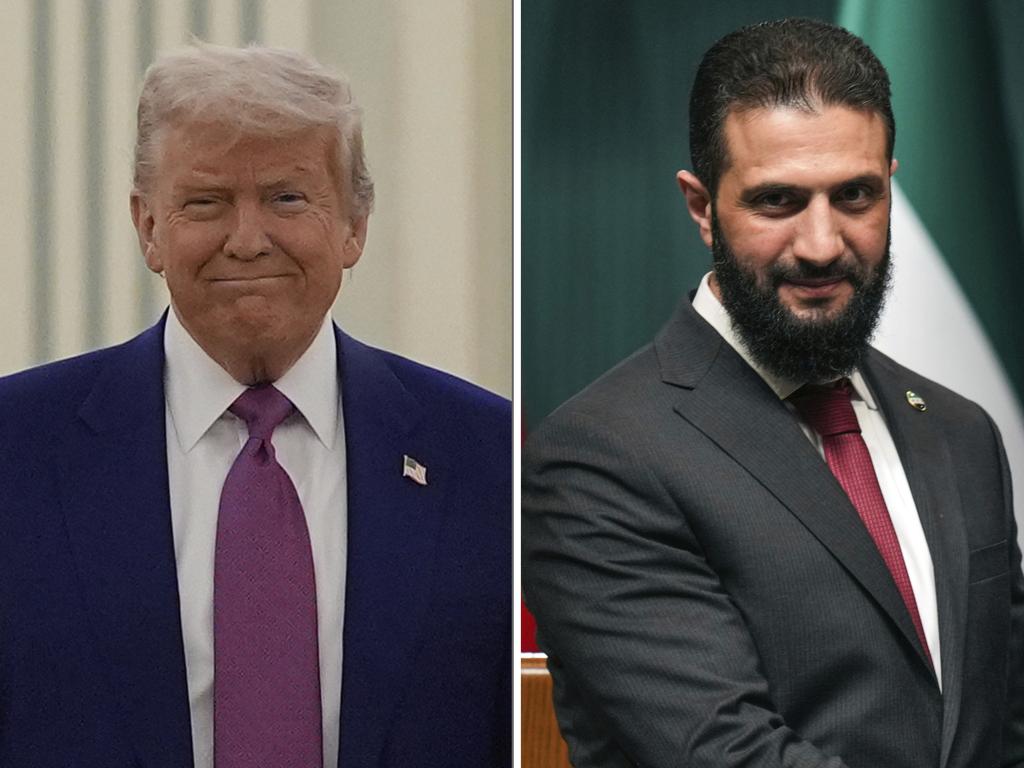
Mr Trump said it was Syrians’ “time to shine” and that easing sanctions would “give them a chance at greatness”.
Syrians celebrated the news, with dozens of men, women and children gathering in Damascus’s Umayyad Square.
“My joy is great. This decision will definitely affect the entire country positively. Construction will return, the displaced will return, and prices will go down,” said Huda Qassar, a 33-year-old English-language teacher.
The Syrian foreign ministry called Mr Trump’s decision a “pivotal turning point” that would help bring stability.
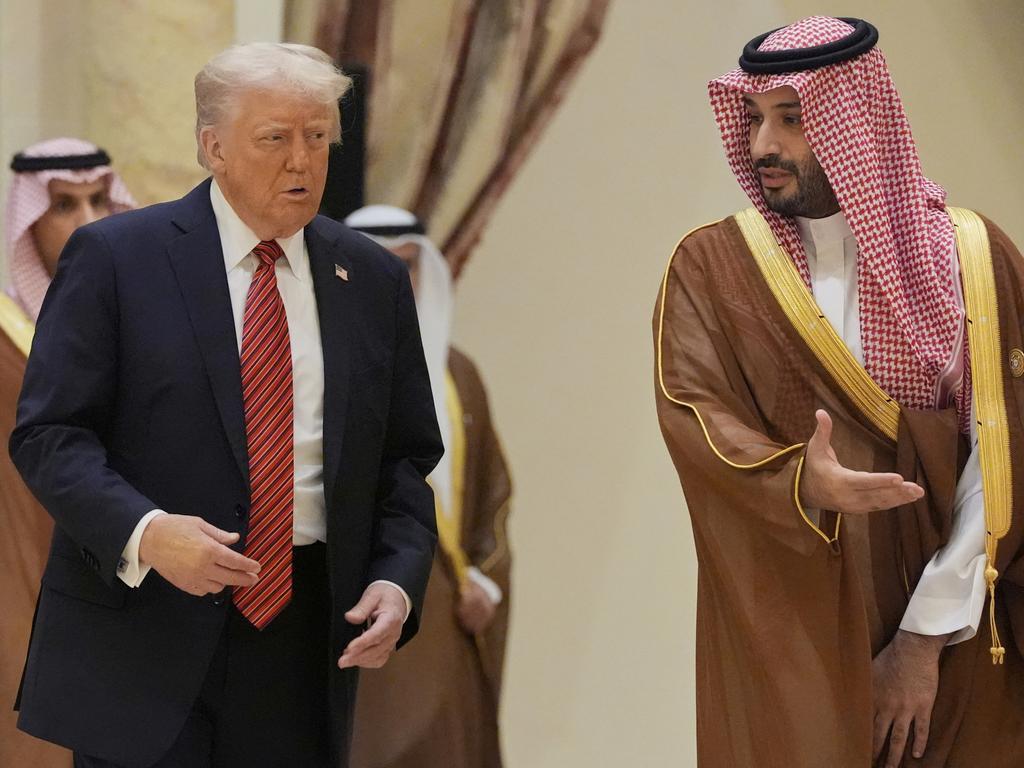
The United States imposed sweeping restrictions on financial transactions with Syria during the brutal civil war and made clear it would use sanctions to punish anyone involved in reconstruction so long as Assad remained in power without accountability for atrocities.
Mr Trump gave no indication that the United States would remove Syria from its blacklist of state sponsors of terrorism – a designation dating back to 1979 over support to Palestinian militants that severely impedes investment.
US, SAUDI ARABIA INK MASSIVE DEAL
Saudi Arabia promised billions of dollars in deals with the United States from defence to artificial intelligence as it threw a lavish welcome for President Trump on the first state visit of his second term.
The Saudis escorted Air Force One into the kingdom with fighter jets before bringing out long-stretching guards of honour and sending flag-waving cavalry to accompany Mr Trump’s motorcade to the palace.
Under imposing chandeliers, Mr Trump welcomed a promise by Saudi Arabia’s de facto ruler, Crown Prince Mohammed bin Salman, for $600 billion (A$929bn) in investment and quipped that it should be $1 trillion.
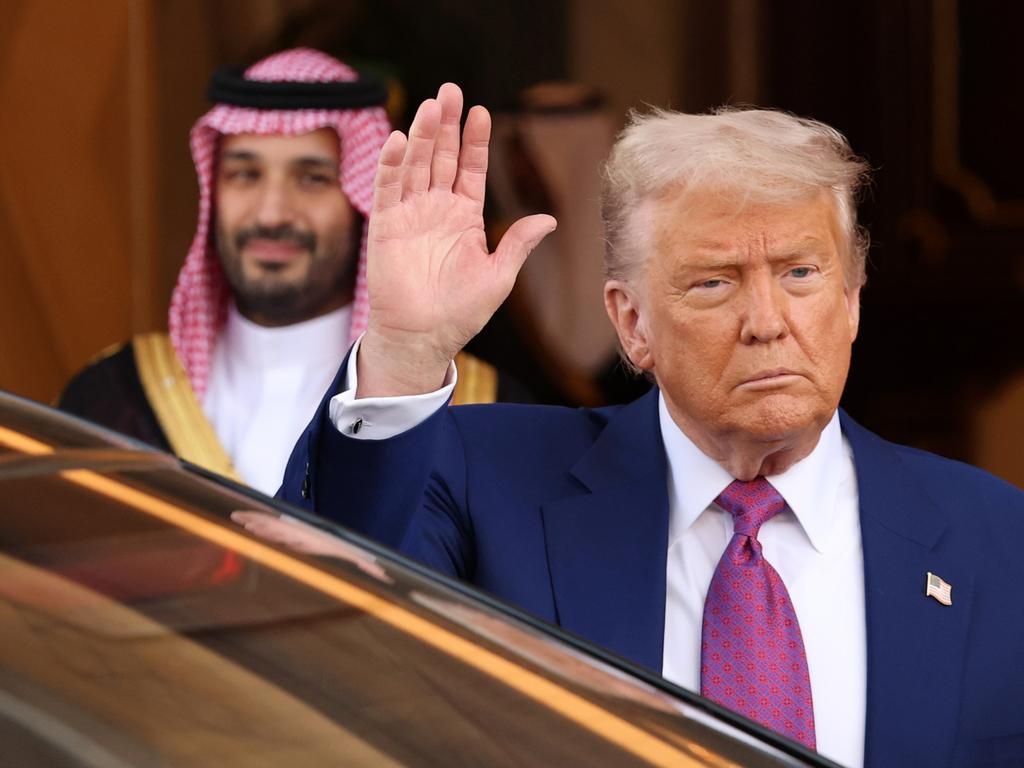
“We have the biggest business leaders in the world here today and they’re going to walk away with a lot of cheques,” Mr Trump told the prince.
For “the United States, it’s probably two million jobs that we’re talking about,” Mr Trump said.
The White House said that Saudi Arabia would buy nearly $142 billion (A$220bn) in weapons in what it described as the largest-ever weapons deal, although Mr Trump in his first term trumpeted a larger, longer-term figure.
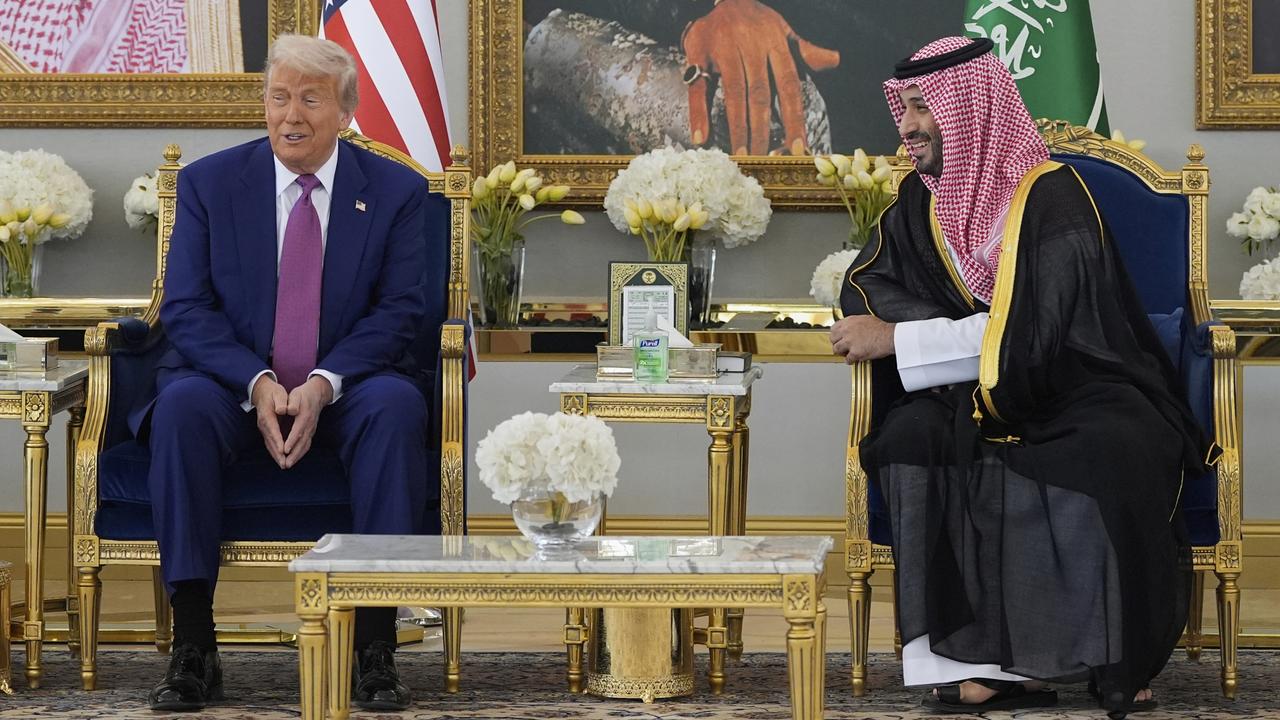
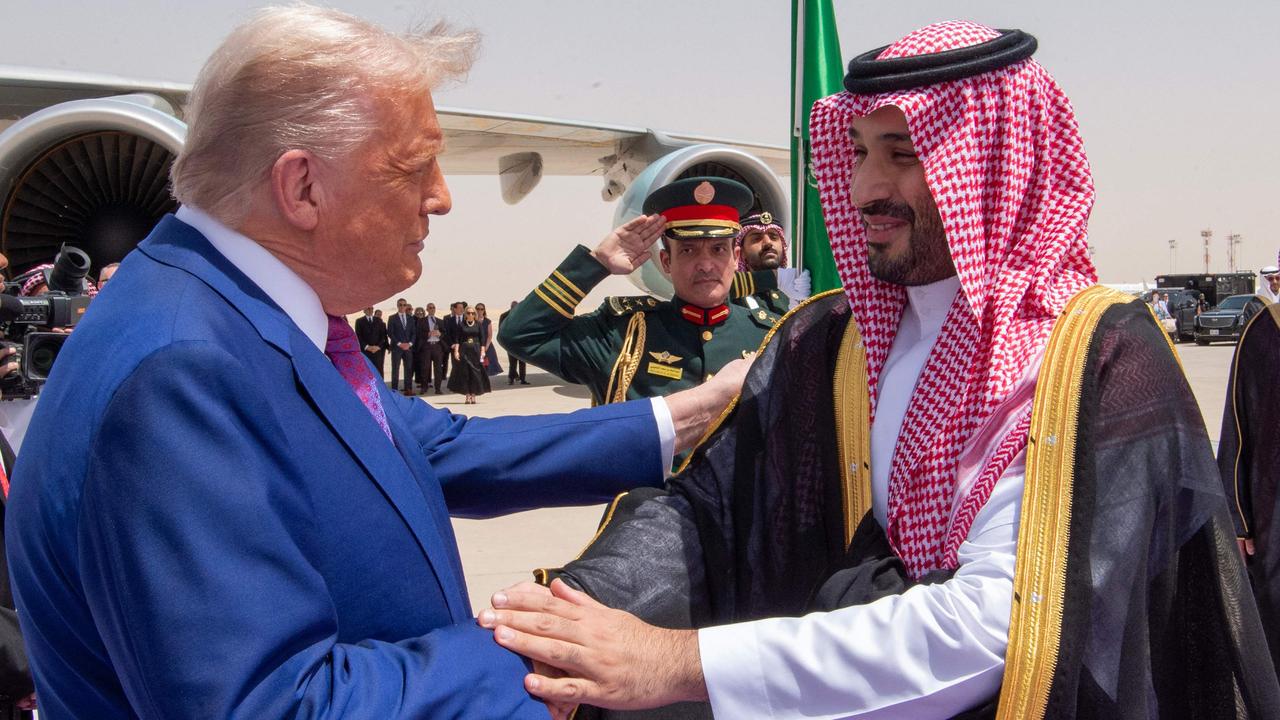
The White House said that Saudi company DataVolt will invest $20 billion (A$31bn) in artificial intelligence-related sites in the United States, while tech firms including Google will invest in both countries – welcome news for Saudi Arabia which has long faced restrictions in US advanced technology.
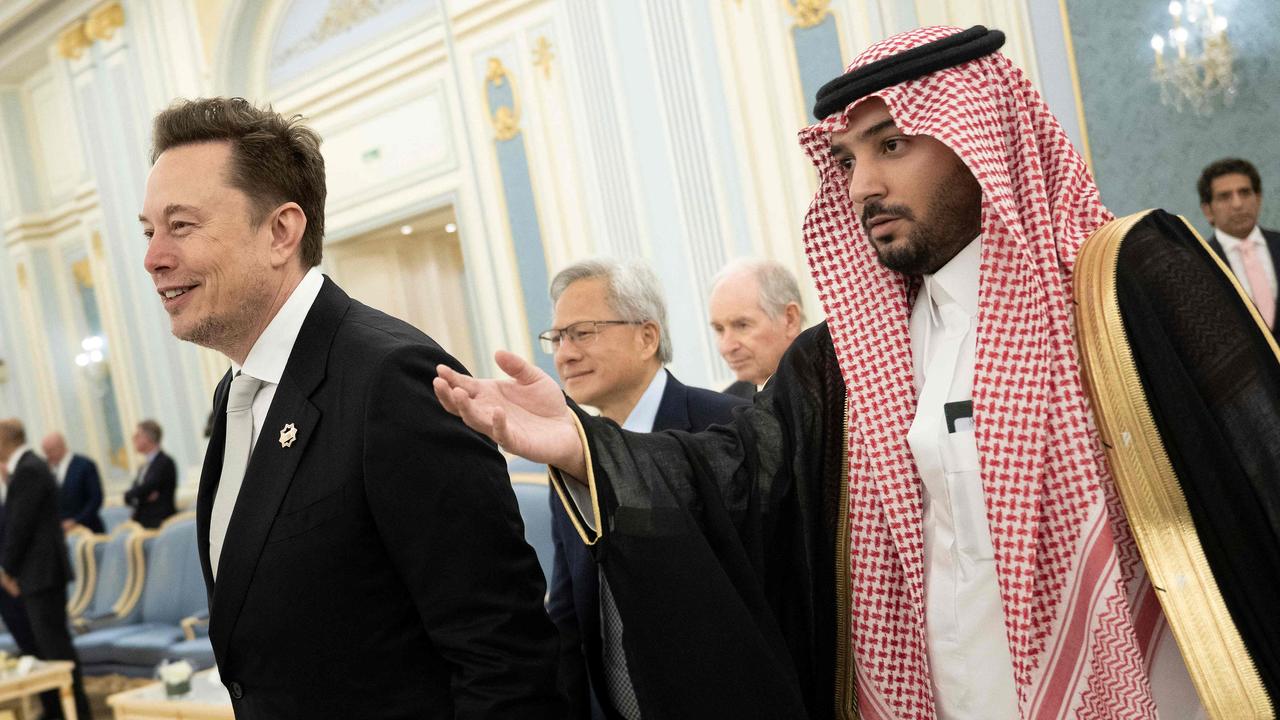
With cameras rolling, a lengthy procession of Saudi royalty and business figures waited their turn to shake hands with Mr Trump and the crown prince, including Elon Musk, the world’s richest person and close adviser to Mr Trump, who made a rare appearance in a suit.
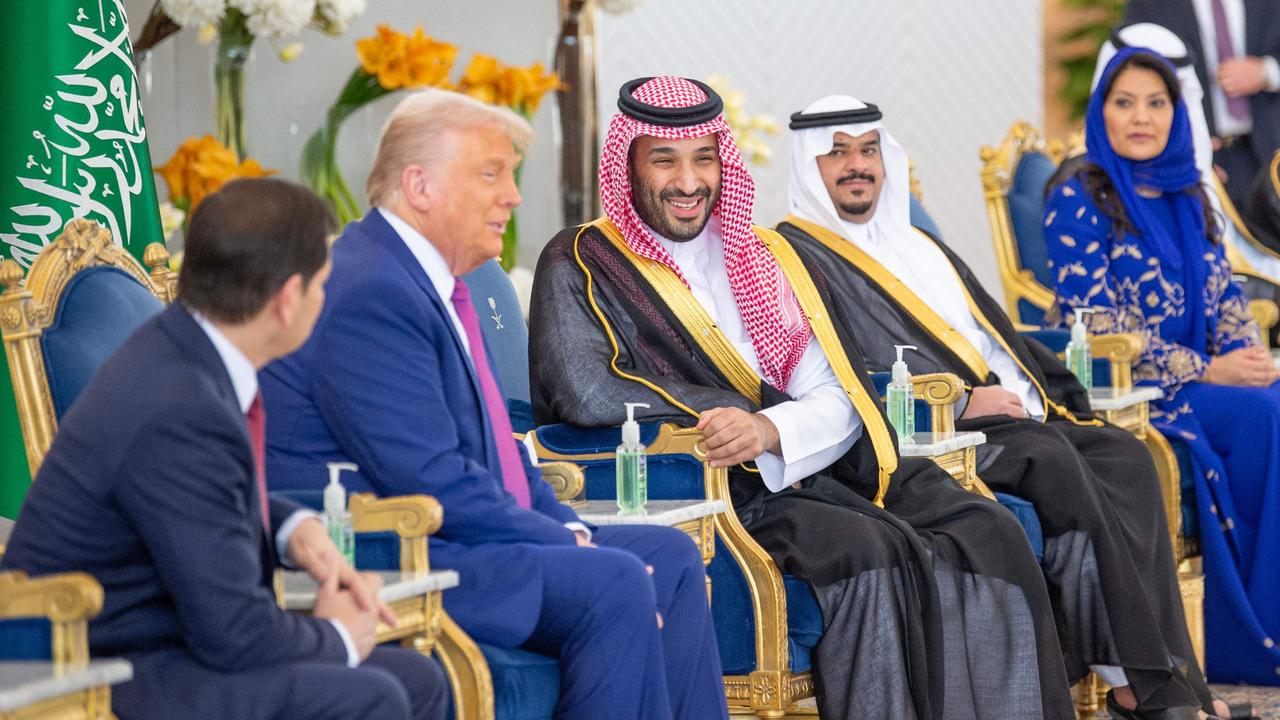
The US leader will head later in the week to Qatar and the United Arab Emirates, fellow oil-rich Arab monarchies with longstanding ties to the United States – and to Mr Trump.
In choosing The Gulf for his first major tour, the 78-year-old billionaire is again bypassing traditional presidential stops among Western allies, some of which have been unnerved by his norms-shattering diplomacy.
Eight years ago, Mr Trump also chose Saudi Arabia for his first overseas trip – when he posed with a glowing orb and participated in a sword dance.
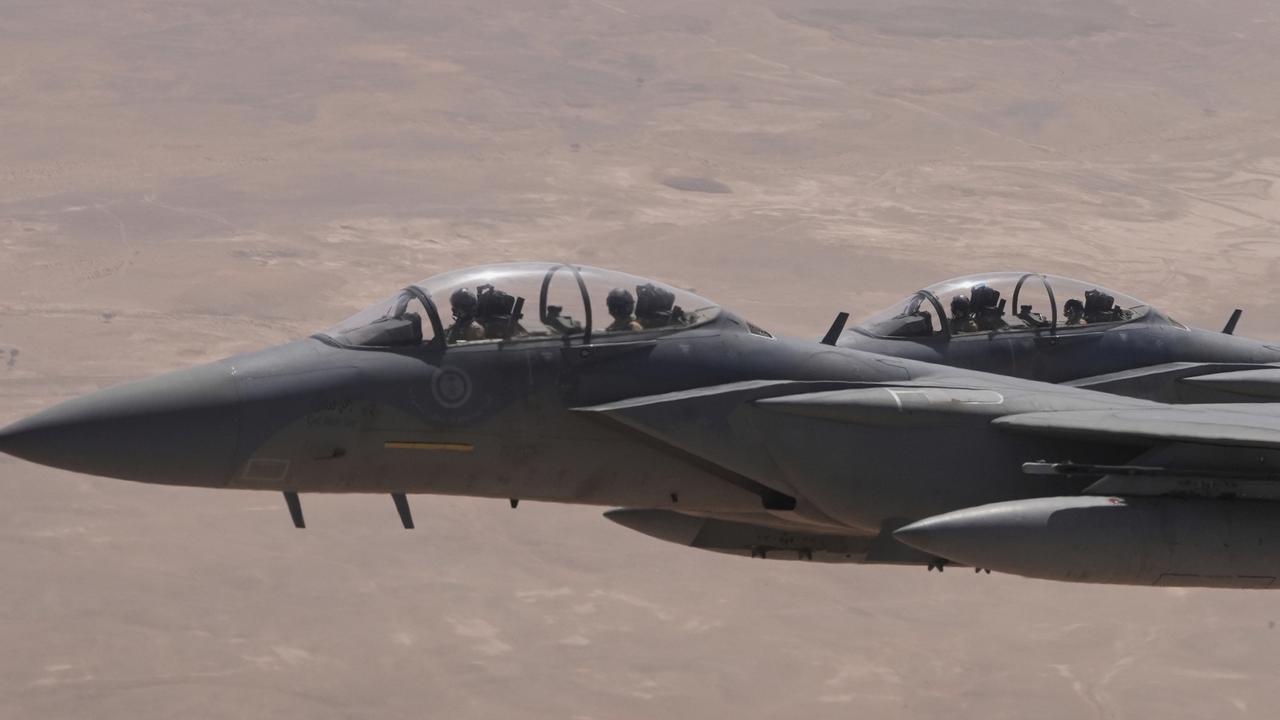
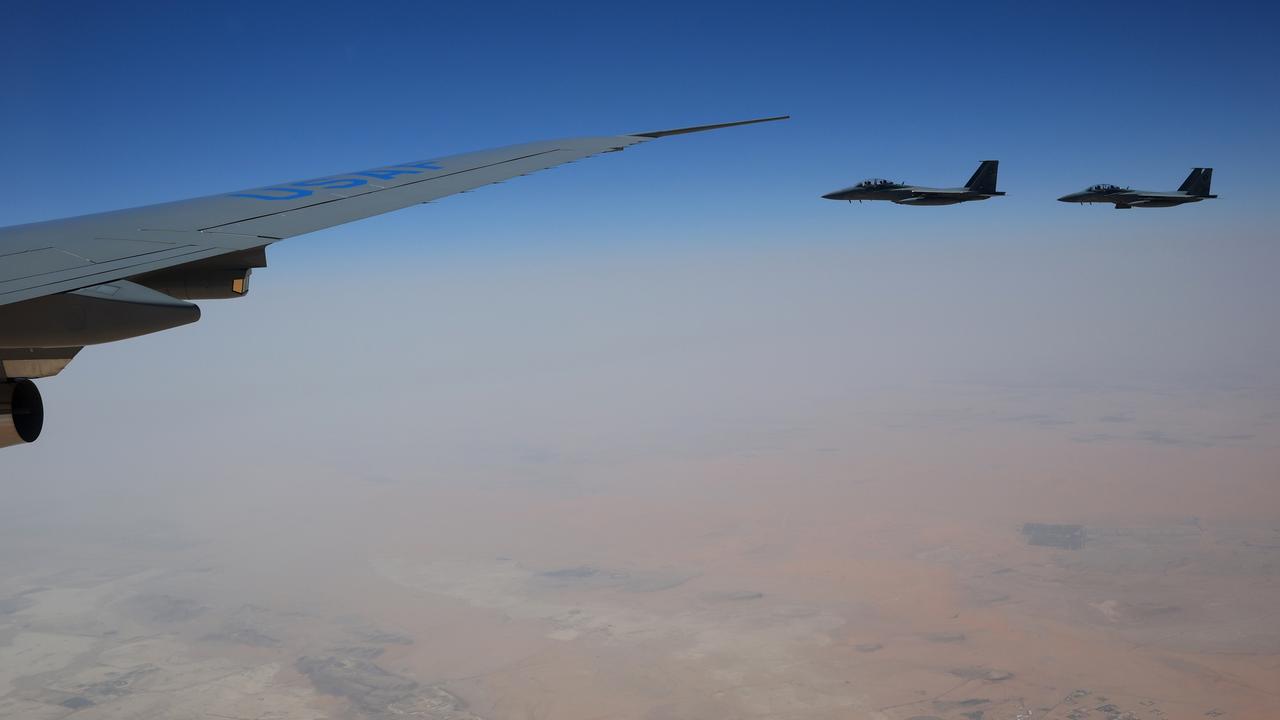
Mr Trump’s embrace of the Saudis contrasts with a more hesitant initial approach by former president Joe Biden, who had vowed to punish the crown prince after US intelligence found that he ordered the murder of dissident Saudi journalist Jamal Khashoggi in 2018.
Mr Trump reminisced with the 39-year-old crown prince over their first meeting, saying he was “so impressed with this young guy who was very wise beyond his years”.
Since Khashoggi’s gruesome killing, Saudi Arabia has worked aggressively to change its image, from easing restrictions on women to diversifying from oil to new areas such as artificial intelligence.
The country has also increasingly exercised diplomatic clout, serving as a venue for the United States to pursue talks with Ukraine and Russia.
More Coverage
Originally published as Trump calls Springsteen a ‘dried out prune’ and labels ex-FBI chief James Comey a ‘dirty cop’








